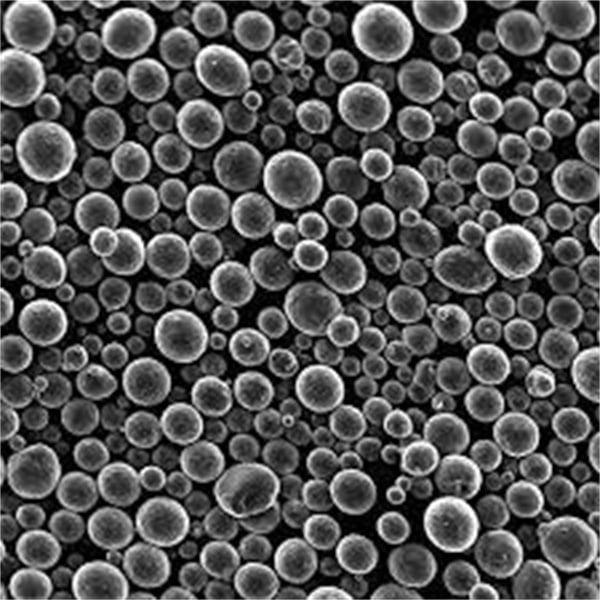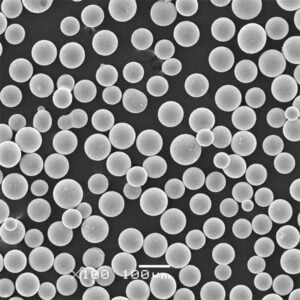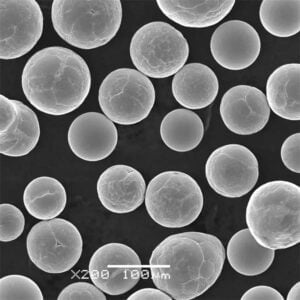Nickellegering 718 pulver
Nickel Alloy 718-pulver, även känt som Inconel 718-pulver, är ett höghållfast, korrosionsbeständigt nickel-kromlegeringspulver.
| Metallpulver | Storlek | Kvantitet | Pris/kg | Storlek | Kvantitet | Pris/kg |
| Inconel 718 | 0-20 μm | 1KG | 60.9 | 53-105 μm | 1KG | 59 |
| 10KG | 39.8 | 10KG | 38 | |||
| 100KG | 34.5 | 100KG | 33 |
Låg MOQ
Tillhandahålla låg minsta orderkvantitet för att möta olika behov.
OEM & ODM
Tillhandahålla kundanpassade produkter och designtjänster för att tillgodose unika kundbehov.
Tillräckligt lager
Säkerställa snabb orderhantering och tillhandahålla tillförlitlig och effektiv service.
Kundtillfredsställelse
Tillhandahålla högkvalitativa produkter med kundnöjdhet i fokus.
dela denna produkt
Innehållsförteckning
Översikt
Nickel Alloy 718-pulver, även känt som Inconel 718-pulver, är ett höghållfast, korrosionsbeständigt nickel-kromlegeringspulver. Det används ofta inom flyg-, olje- och gas-, fordons- och andra högtemperaturapplikationer på grund av dess utmärkta mekaniska egenskaper och motståndskraft mot oxidation och korrosion vid höga temperaturer.
Några viktiga egenskaper hos Nickel Alloy 718 pulver inkluderar:
- Hög hållfasthet och hårdhet upp till ~650°C
- Enastående korrosionsbeständighet
- Utmärkt kryp- och utmattningshållfasthet
- God svetsbarhet och maskinbearbetning
- Hög slaghållfasthet och seghet
- Kan värmebehandlas för optimala egenskaper
Nickel Alloy 718-pulver används oftast i additiva tillverkningstekniker som selektiv lasersmältning (SLM), elektronstrålesmältning (EBM) och bindemedelssprutning för att tillverka komplexa geometrier. Andra användningsområden är formsprutning av metall (MIM) och termisk eller kall sprutning.
Sammansättning
Den typiska kemiska sammansättningen av Nickel Alloy 718 pulver är:
| Element | Vikt % |
|---|---|
| Nickel (Ni) | 50 – 55 |
| Krom (Cr) | 17 – 21 |
| Järn (Fe) | Balans |
| Niob (Nb) | 4.75 – 5.5 |
| Molybden (Mo) | 2.8 – 3.3 |
| Titan (Ti) | 0.65 – 1.15 |
| Aluminium (Al) | 0.2 – 0.8 |
| Kobolt (Co) | ≤ 1 |
| Koppar (Cu) | ≤ 0.3 |
| Mangan (Mn) | ≤ 0.35 |
| Kisel (Si) | ≤ 0.35 |
| Fosfor (P) | ≤ 0.015 |
| Svavel (S) | ≤ 0.015 |
| Bor (B) | ≤ 0.006 |
| Kol (C) | ≤ 0.08 |
De viktigaste legeringselementen som Ni, Cr, Nb och Mo bidrar till hög hållfasthet genom mekanismerna utskiljningshärdning och solid lösningsförstärkning. Järn är den huvudsakliga basmetallen tillsammans med nickel. Mindre tillsatser av Al och Ti hjälper till att kontrollera kornstrukturen. Spårämnena är begränsade för att förhindra skadliga effekter.
Fastigheter
Nickel Alloy 718 pulver erbjuder en unik kombination av enastående egenskaper, vilket gör det lämpligt för högpresterande delar i alla branscher:
| Fastighet | Beskrivning |
|---|---|
| Styrka | Draghållfasthet på 1.300 MPa i glödgat tillstånd. Kan nå över 1.500 MPa efter åldershärdande värmebehandling |
| Hårdhet | hårdhet över 470 HB |
| Täthet | 8,19 g/cm3 |
| Smältpunkt | 1,260-1,336°C |
| Termisk konduktivitet | ~11 W/m-K |
| Elektrisk resistivitet | ~125 μΩ-cm |
| Termisk expansion | ~13 μm/m-°C |
| Elastisk modul | ~205 GPa |
| Töjning | Över 12% |
| Slaghållfasthet | Upp till 100 J vid rumstemperatur |
| Utmattningshållfasthet | Mycket hög utmattnings- och krypningsbeständighet |
| Oxideringsbeständighet | Motstår oxidation upp till 700°C |
| Motståndskraft mot korrosion | Utmärkt motståndskraft mot SCC och andra former av vattenbaserad korrosion |
| Svetsbarhet | God svetsbarhet |
| Bearbetbarhet | Förbättrad maskinbearbetbarhet jämfört med vanlig 718 nickellegering |
Den höga hållfastheten bibehålls till över 650°C tillsammans med god duktilitet och seghet. Det har mycket bättre beständighet mot krypning, utmattning och spricktillväxt än rostfritt stål. Den enastående korrosionsbeständigheten möjliggör applikationer i tuffa miljöer. Dessa välbalanserade egenskaper gör Nickel Alloy 718 lämplig för kritiska komponenter.
Egenskaper
Några unika egenskaper hos Nickel Alloy 718 pulver inkluderar:
- Ålders- eller utskiljningshärdning - Utvecklar styrka över tid vid värmebehandling genom utfällning av intermetalliska Ni3(Al,Ti) gamma prime och kroppscentrerade tetragonala Ni3Nb gamma double prime-faser
- Förstärkning av fast lösning - Legeringsämnen som Mo och Cr löses upp i nickel-järnmatrisen och ökar baslinjestyrkan
- Värmebehandlingsbar - Kan lösningsglödgas och utskiljningshärdas för att skräddarsy egenskaper enligt applikationsbehov
- Producerar stabila, sega oxidskikt som ger korrosionsbeständighet
- Kryogenisk seghet - Bibehåller duktilitet och seghet vid extrema temperaturer under noll grader
- Lätt att uppnå finkornig mikrostruktur med hjälp av AM-processer med pulverbäddfusion
- HIP's förmåga - Varm isostatisk pressning kan eliminera inre porositet i AM-delar
- Bra processbarhet för additiv tillverkning med måttliga lasereffekter
Specifikationer
Nickel Alloy 718 pulver finns i olika storleksfördelningar klassificerade i olika kategorier:
Storleksintervall
| Kategori | Storleksintervall (μm) |
|---|---|
| Fin kvalitet | 15-45 |
| Extra fin kvalitet | 10-22 |
| Submikron kvalitet | 0.5-15 |
Storleksfördelning
Typiska storleksfördelningar för AM-processer:
| Storleksfördelning | D10 (μm) | D50 (μm) | D90 (μm) |
|---|---|---|---|
| 15-45 μm | 20 | 35 | 40 |
| 10-22 μm | 12 | 18 | 22 |
Kemisk renhet
| Betyg | Renhet |
|---|---|
| Standard | ≥ 99,9% |
| Hög renhet | ≥ 99,95% |
| Ultrahög renhet | ≥ 99,99% |
Standarder
Nickel Alloy 718 pulversammansättningar är standardiserade enligt:
- ASTM B637
- AMS 5596G
- AMS 5662M
Anpassade kompositioner som är skräddarsydda för AM finns dock också tillgängliga.
Tillämpningar
Nickel Alloy 718-pulver används inom olika branscher för att tillverka kritiska komponenter via AM eller andra pulvermetallurgiska processer:
Industri
| Tillämpning | |
|---|---|
| Flyg- och rymdindustrin | Turbinblad, skivor, axlar, kugghjul, höljen, strukturella fästen |
| Olja och gas | Komponenter till borrhålshuvud, borrhålsverktyg, ventiler, pumpar |
| Fordon | Delar till turboladdare, motorkomponenter |
| Medicinsk | Ortopediska implantat, proteser |
| Försvar | Missilkomponenter, delar till rotorsystem |
| Kraftgenerering | Delar till heta sektioner i ång- och gasturbiner |
| Kemisk bearbetning | Värmeväxlare, reaktionskärl |
Komponenter
| Komponent |
|---|
| Turboladdare hjul |
| Foder till förbränningsugnar |
| Tätningsringar |
| Rör för värmeväxlare |
| Ventilhus |
| Termiska sprutbeläggningar |
Den utmärkta hållfastheten och korrosionsbeständigheten vid förhöjda temperaturer gör detta material till ett förstahandsmaterial för tillverkning av strukturella komponenter med varma profiler. Krypbeständigheten möjliggör långvarig lastbärande prestanda. Nickel Alloy 718 används också i kryogena applikationer tack vare sin duktilitet vid låga temperaturer.
Leverantörer
Nickel Alloy 718-pulver som är lämpligt för AM- och termiska sprutprocesser levereras av ledande tillverkare:
Leverantörer
| Företag | Varumärken | Produktionsmetoder |
|---|---|---|
| Sandvik | Osprey® 718 | Atomisering av gas |
| Praxair | TRU 718 | Atomisering av gas |
| Snickare Tillsats | CR 718 | Atomisering av gas |
| Erasteel | EZ 718 | Atomisering av gas |
| AP&C | PulNi 718 | Atomisering av gas |
| SLM-lösningar | IN718 | Atomisering av gas |
| LPW-teknik | LP18Ni700 | Atomisering av gas |
Prislista för Met3dp in718-pulver
| Metallpulver | Storlek | Kvantitet | Pris/kg | Storlek | Kvantitet | Pris/kg |
| Inconel 718 | 0-20 μm | 1KG | 60.9 | 53-105 μm | 1KG | 59 |
| 10KG | 39.8 | 10KG | 38 | |||
| 100KG | 34.5 | 100KG | 33 |
Priserna varierar från leverantör till leverantör beroende på ordervolym, pulverkvantitet, ytterligare pulverkaraktärisering och renhetsgrad.
Hur man väljer rätt nickellegering 718 pulver
Att välja rätt typ av pulver av Nickel Alloy 718 är avgörande för att få AM-komponenter av hög kvalitet. Här är några viktiga överväganden:
Storleksintervall
- Den allmänna regeln är att finare är bättre för upplösning och ytfinish
- Men för fint leder till dåligt pulverflöde och spridningsförluster
- 15-45 μm är optimal balans för de flesta AM-processer
Storleksfördelning
- Tätare distributioner som Dv90 < 10 μm förbättrar densiteten
- Men räckvidden tillåter god packningstäthet
Sfäriskhet och morfologi
- Mycket sfäriskt och jämnt pulver som flyter fint, packar sig tätt och sprider sig jämnt
- Oregelbundna partiklar kan påverka materialegenskaperna negativt
Kemisk sammansättning
- Håller sig till ASTM-standardsammansättning för beprövad legeringsprestanda
- Säkerställ låg syre- och kvävehalt för att förhindra porositet och svaghet
- Hög pulverrenhet minskar skadliga partiklar i andra fasen
- Kundanpassade kompositioner tillgängliga för förbättrad AM-bearbetbarhet
Mikrostruktur
- Gasatomisering ger finkornig struktur som är avgörande för mekaniska egenskaper
- Avsaknad av texturering ger isotropisk styrka
- Kontaminering och satelliter kan orsaka defekter
Pulveregenskaper
- God flytbarhet och spridbarhet underlättar AM-bearbetning
- Den skenbara densiteten påverkar direkt detaljens slutliga densitet
- Analysera alla egenskaper enligt ASTM- och MPIF-standarder
Hur man bearbetar nickellegering 718 pulver
Nickel Alloy 718-pulver kan bearbetas via flera AM-tekniker samt sekundära operationer:
Additiv tillverkning
Populära AM-processer
| Process | Beskrivning |
|---|---|
| Binder Jetting | Vätskeformigt bindemedel sammanfogar selektivt pulverpartiklar |
| Deposition med riktad energi | Fokuserad termisk energi smälter pulver för deponering lager-för-lager |
| Smältning med elektronstråle | Elektronstråle med hög effekt smälter selektivt pulverbädden |
| Laserpulverbäddsfusion | Laserskanning smälter och konsoliderar pulverlager |
| Formsprutning av metall | Binder pulver med polymer, sedan avbinds och sinteras |
Alla tekniker ger nästan helt nya detaljer som kräver viss efterbearbetning. Binder jetting kräver infiltration för att konsolidera gröna kompakter medan pulverbäddsfusion ger komponenter med hög densitet. Alla alternativ ger geometrisk frihet och möjlighet till kundanpassning.
Parametrar för bästa praxis
För laserpulverbäddsfusion med Nickel Alloy 718:
- Lasereffekt: 195-250 W
- Skanningshastighet: 700-850 mm/s
- Avstånd mellan luckorna: 0,09-0,12 mm
- Skikttjocklek: 20-50 μm
Använd varm isostatisk pressning för att eliminera kvarvarande porositet och förbättra materialegenskaperna.
Värmebehandling
Typiskt förfarande för värmebehandling:
- Varm isostatisk pressning
- 1.160°C, 100 till 150 MPa, 4 timmar
- Glödgning av lösning
- 980°C, hållfasthet 1 timme, argonsläckning
- Åldershärdning
- 720°C, 8 timmar, ugnskylning till 620°C
- 620°C, 8 timmar, luftkylning
Detta ger en enhetlig gamma double prime-mikrostruktur och uppnår optimal hållfasthet genom utskiljningshärdning. Lösningsvärmebehandling löser upp Nb/Ti-rika intermetalliska ämnen medan åldring fäller ut dem på ett homogent sätt.
Ytfinish
Den färdiga ytjämnheten ligger i genomsnitt på 15-20 μm Ra beroende på processparametrarna. Olika efterbehandlingsoperationer ger släta ytor:
- CNC-bearbetning
- Tumlande/vibrerande efterbehandling
- Kemisk etsning
- Elektropolering
- Shot peening
De flesta AM Nickel Alloy 718-komponenterna bearbetas till måttnoggrannhet och önskad ytfinish.
Tillämpningar av additivt tillverkade delar av nickellegering 718
AM möjliggör konsolidering av flera komponenter och optimerade geometrier med hjälp av Nickel Alloy 718:
| Industri | Komponenter | Fördelar |
|---|---|---|
| Flyg- och rymdindustrin | Turbinblad, munstycken till raketer | Komplexa kylkanaler, aerofoil-former |
| Olja & Gas | Tätningsringar, pumphus, ventiler | Konform kylning, minska antalet delar |
| Fordon | Turboladdare hjul | Minskad massa genom gitterstrukturer |
| Kraftgenerering | Komponenter för varmgasväg | Korta ledtider för föråldrade delar |
| Kemisk bearbetning | Rördelar, reaktionskärl | Överlägsen korrosionsbeständighet |
Lättare gitterstrukturer ger lägre komponentvikt. Konforma kylkanaler i verktyg med heta sektioner ökar effektiviteten. Topologioptimerade former minskar fluiddynamiska förluster. Allt detta minskar livscykelkostnaderna i form av råmaterial, energiförbrukning och underhåll.
Samtidigt möjliggör bindemedelsstrålning och deponering med riktad energi snabb verktygstillverkning, prototyptillverkning och produktion av korta serier direkt i Nickel Alloy 718.
Fördelar kontra nackdelar med nickellegering 718 pulver
Proffs
- Extremt hög hållfasthet och hårdhet bibehålls upp till ~650°C
- Utmärkt motståndskraft mot krypning, utmattning, sprickbildning och korrosion
- Bibehåller styrka och duktilitet vid kryogena temperaturer
- Nära isotropiska mekaniska egenskaper
- Beprövad legering med lättillgängligt råmaterialpulver
- Kostnadsfördel jämfört med Ni superlegeringar som är svåra att bearbeta
- Anpassning och designflexibilitet med hjälp av AM
- Konsolidering av komponenter och lättviktsstrukturer
Nackdelar
- Mindre potential för varm isostatisk pressning jämfört med gjuten legering 718
- Fortfarande benägen att drabbas av stelningssprickor i AM
- Kräver värmebehandling för optimala egenskaper
- Lägre hållfasthet än vissa Ni-superlegeringar
- Känslig för byggfel som är typiska för AM-processer i metall
- Pulver är relativt dyrt jämfört med rostfritt stål
Korrekt parameteroptimering och rigorös kvalitetskontroll under tillverkningen av AM-komponenter är avgörande för att utnyttja den fulla kapaciteten hos detta högpresterande material.
Framtidsutsikter för Nickel Alloy 718 Powder
Nickel Alloy 718 kommer även fortsättningsvis att få ökad användning inom AM för flyg- och rymdindustrin, gasturbiner, verktyg och andra krävande applikationer:
- Nya flygplansmotorer har över 40% AM-innehåll som ger betydande kostnadsbesparingar genom viktminskning, förbättrad effektivitet och konsolidering av delar
- Sjunkande priser på AM-maskiner och bredare materialkvalificering kommer att öka användningen
- Höghållfasta, anpassade legeringsvarianter utvecklas för att flytta fram gränserna ytterligare
- Nya värmebehandlingar utvärderas för maximal utskiljningshärdning tillsammans med HIP
- Hybridtillverkning som kombinerar AM, maskinbearbetning och ytbehandling möjliggör stora volymer
- Ökad standardisering av AM-processparametrar, pulverspecifikationer och protokoll för kvalificering av delar kommer att underlätta tillväxten
Med pulvermetallurgiska metoder som AM som utvecklas ytterligare kommer Nickel Alloy 718 att fortsätta tillgodose behoven av specialiserade komponenter där prestanda väger tyngre än bearbetningskostnaderna.
Vanliga frågor
Q. Varför är Nickel Alloy 718 att föredra framför rostfritt stål för högtemperaturtillämpningar?
A. Nickellegering 718 bibehåller mycket högre hållfasthet, hårdhet och korrosionsbeständighet vid temperaturer över 650°C jämfört med rostfritt stål. Den erbjuder också markant bättre kryphållfasthet vilket möjliggör statisk lastbärande förmåga vid höga temperaturer.
Q. Vilket partikelstorleksintervall är optimalt för AM med Nickel Alloy 718-pulver?
A. Ett partikelstorleksintervall på 15-45 mikrometer ger en bra balans mellan upplösning, ytfinhet, pulverflödesförmåga och packningstäthet. Finare pulver under 10 mikrometer kan vara svårare att bearbeta.
Q. Kräver Nickel Alloy 718-pulver varm isostatisk pressning efter additiv tillverkning?
A. Varm isostatisk pressning (HIP) eliminerar inre hålrum och porositet i AM Nickel Alloy 718-komponenter. Detta gör det möjligt att uppnå en densitet nära 100% och isotropiska materialegenskaper. HIP rekommenderas men är inte obligatoriskt före värmebehandling.
Q. Varför är Nickel Alloy 718 att föredra för kryogena applikationer jämfört med andra legeringar?
A. Till skillnad från andra höghållfasta legeringar bibehåller Nickel Alloy 718 märkbar duktilitet och seghet i kryogena temperaturer under noll grader samtidigt som den behåller sin styrka. Detta gör den lämplig för lagring av flytande gas och transporttillämpningar.
Q. Har Nickel Alloy 718 pulver bättre korrosionsbeständighet jämfört med smideslegering 718?
A. Både pulver- och smideslegeringen Alloy 718 erbjuder liknande enastående korrosionsbeständighet i olika medier. Pulverbaserad AM möjliggör tillverkning av komponenter med komplexa optimerade geometrier som ytterligare förbättrar korrosionsbeständigheten.
Få det senaste priset
Om Met3DP
Produktkategori
HOT SALE
KONTAKTA OSS
Har du några frågor? Skicka oss meddelande nu! Vi kommer att betjäna din begäran med ett helt team efter att ha fått ditt meddelande.

Metallpulver för 3D-printing och additiv tillverkning
FÖRETAG
PRODUKT
cONTACT INFO
- Qingdao City, Shandong, Kina
- [email protected]
- [email protected]
- +86 19116340731












